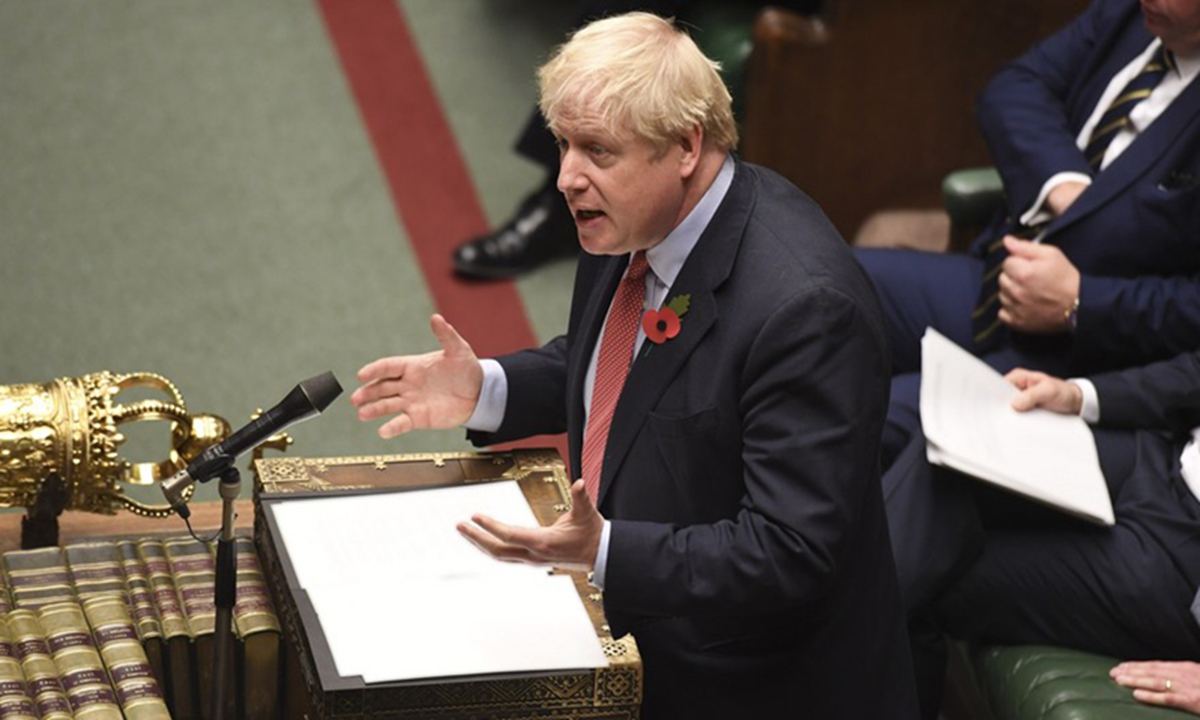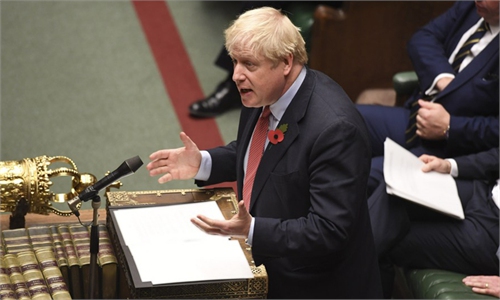
British Prime Minister Boris Johnson speaks at the House of Commons in London, Britain, on Oct 29, 2019. File photo:Xinhua
British Foreign Secretary Dominic Raab and his Indian counterpart, Indian External Affairs Minister S. Jaishankar, met in New Delhi recently. Reports show that India has accepted British Prime Minister Boris Johnson's invitation for the G7 summit to be held in the UK next year. Also, the UK will dispatch its aircraft carrier the HMS Queen Elizabeth and its escort fleet to the Indo-Pacific next year. Johnson will also make his first visit to India in January. It seems that ties between the two sides are warming sharply.
The UK is attaching great importance to India in the post-Brexit era. What is the intention behind its frequent moves to deeply engage the Asia-Pacific region?
Strengthening UK's bilateral relationship with India is a vital part of the "Global Britain" campaign. In recent years, there have been constant appeals within the UK to shift its trade focus. After Brexit, the UK urgently needs to boost commodity trade with Asian countries and regain its reputation as "a great, global trading nation."
The UK has paid attention to revitalize its links with former colonies of the empire, boost diplomatic ties with countries like India, and reshape once close relations.
In terms of economic growth potential and cultural exchanges, India is a rare potential partner in Asia for the UK. Indeed, the UK covets India's vast markets and large population. However, ties between the two have fundamentally changed compared with the last century. There is no evidence which shows that India still has any special affection for its former imperial master. In fact, India once skipped the Commonwealth heads of government meeting. Although the Modi government's interest in the Commonwealth meetings has increased in recent years, New Delhi wants to become the leader of these meetings and views them as a stage for communication between India and some African countries.
However, Britain drawing India in during this period also suggests a strong strategic intention to confront China. It is no exaggeration to say that bilateral relations between China and the UK as a whole have fallen to their lowest point since David Cameron was serving as prime minister. In the business sector, Britain has demanded that its communications network be completely cleaned of 5G technology by China's Huawei, citing "national security" as the excuse. In the political field, London has publicly criticized Beijing's political measures to safeguard national sovereignty and the stability of Hong Kong SAR. It has given empty promises to Hong Kong citizens who hold British overseas visas to live in the UK. As the host of the forthcoming G7 Summit, Britain openly invited India, Japan, South Korea and Australia to "tackle common challenges,"a move widely interpreted as targeting China.
Some members of the British Parliament have even suggested to formally recognize the island of Taiwan in the future to demonstrate Britain's "determination" to confront China.
To woo India and claim aircraft carrier to cruise in the Asia-Pacific is just a series of publicity stunts aimed to "show off" Britain's purported power. The question is: Does Britain really have the "international appeal" it aspires to have? The sun set on the British Empire a long time ago.
Truth to be told, the current British government is in the midst of its most uncertain time in office. Failure to contain the COVID-19 pandemic, withdrawing from the EU, and unemployment pressure all threaten the premiership of Prime Minister Boris Johnson. It is widely believed that indecisive decision-making mechanisms contributed to Britain's failure to properly respond to the pandemic, and the second wave combined with the new strain is expected to be far more severe.
The Organization for Economic Cooperation and Development said in its economic outlook released on December 1 that the global output will return to pre-pandemic levels by the end of 2021. But the UK's economic recovery will lag behind every other major economy - apart from Argentina. The report also said that the UK's economy would still be 6.4 percent smaller than it was in the fourth quarter of 2019.
The Office for Budget Responsibility (OBR) has predicted that the UK's economy will suffer a drop of 4 percent in output over the long-term from Brexit - even if the UK and the EU sign a free trade deal. It is reported that a no-deal Brexit would wipe out another 2 percent of the economy in 2021 and lead to a long-term decline in GDP. The OBR forecasts that unemployment will peak at 8.3 percent in the third quarter of 2021 if there is no agreement.
The increasingly severe social and livelihood issues in the UK are inherently connected to its high-profile anti-China foreign policy. On the one hand, all recognize that deep social contradictions may drag the UK into a long and painful recession. On the other hand, neither members of parliament nor politicians are displaying their sincerity and solidarity to tackle domestic political problems. Instead, they only fool themselves with empty slogans from their imaginations. They slander and confront China. The UK's politics lacks long-term strategic visions with short-sighted opportunists seizing control of politics.
The author is a scholar at Shanghai International Studies University. opinion@globaltimes.com.cn

